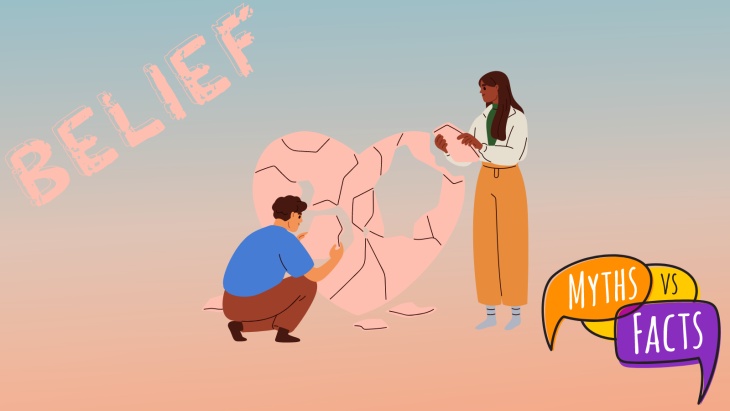Recent Posts
- I broke up with my partner, but now I am having doubts. Did I do it out of the right reasons or was I just being fearful?
- My Quick Temper Pushes People Away. What Do I Do To Manage My Anger?
- How does noise affect my mental health?
- I want to be a better problem solver. What is a step by step approach?
- Escapism. When is it healthy? When is it damaging?
Most Popular
Looking at common beliefs on love and connection. Busting relationship myths.

Looking at common beliefs on love and connection. Busting relationship myths.
Witty remarks and romantic views on love and relationships may make us smile, but are they really reliable? Do they bring us closer to a healthy relationship?
When romantic myths are taken as the real nature of love, it can be misleading, illogical and very difficult to achieve. Let’s look deeper into them and separate the valuable views and discard the harmful ones.
Love and Relationship Myths
Myth #1 Communicating using one or two love languages is enough to communicate my love.
The theory on the 5 love languages, created by Gary Chapman, proposes that each one has the ability to give and receive love through words of affirmation, acts of service, gifts, quality time and physical touch. In addition, it says that we can communicate how much we love another person by doing activities that correspond to 1 or 2 of the love languages they use to typically receive love. (1)
Researchers who took a closer look at the 5 Love Languages say that using only 1 or 2 of the “love languages” is not enough, and instead they propose a more balanced approach to love. We show our love more effectively by including diverse and ever-changing expressions of love.
Myth #2 Love is all we need. It solves all relationship problems.
When we choose to see only the good traits in the one we love and ignore their character-flaws, we might be infatuated, and not in love. Although being infatuated brings excitement, novelty and adventure to a relationship, it can also stop us from making logical decisions.
In the event that we see their major flaws, and we become convinced that our love is the solution to them changing their behavior, it becomes a painful experience.
Without the other person desiring to change and doing their own share in changing their own lives, we will be left frustrated, disappointed and hurt.
Common major red flags are anger management issues, total dependence on others, lack of action to have an independent and healthy life, and inability to communicate their affection and commitment.
What we mistake for love also causes us to be cut off from family, friends and the community for the sake of the relationship. We believe that “this love is all we need.” One red flag in a relationship is when almost everyone close to you disapproves of the relationship, and your partner causes you to isolate yourself from friends, family and other significant people in your life. You may want to proceed with caution and assess the relationship.
Myth #3. Opposites attract and last longer in a relationship.
Research has shown that people who perceive themselves more similar to one another tend to have greater attraction. When our personality complements our partner’s, we are more likely to want to spend time with them.
In addition, instead of expecting instant connection, realizing that it would take time in order to find another person that fits us personality-wise is more realistic. Don’t rush into making a commitment, but spend some time getting to know that person, learning about their quirks, interests, and deeper parts of their character. Then you can decide whether you want to build a relationship with them. This way, your relationship is based on a more solid foundation.
Myth #4. Jealousy and violent behaviors are signs of true love.
Media may have played a hand in portraying violent behavior and jealousy as part of romantic love, even to the point of using violence as a way to resolve conflicts. Of course, all relationships would eventually go through conflicts, there are harmless ways to resolve them and knowing healthy conflict-management skills can even improve happiness in a relationship.
However, when jealousy which often leads to threat and/or violence is normalized in a relationship, the relationship becomes marked with harassment, abuse, hurts, anger, and trauma.
Couples in a loving relationship are both imperfect in character, and have a lot of room to grow, but by being open to becoming better persons, the relationship is sure to grow.
Check with an available online mental health professional or a licensed psychologist to help you navigate relationship stresses and build better relationship skills.







Comments